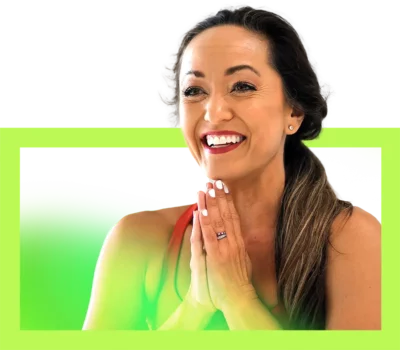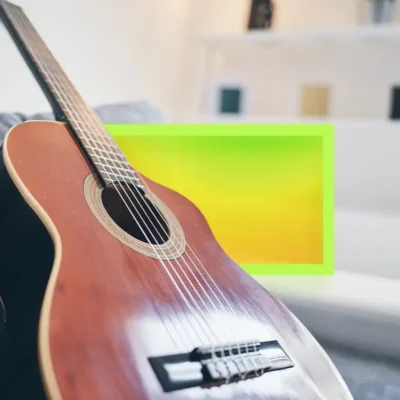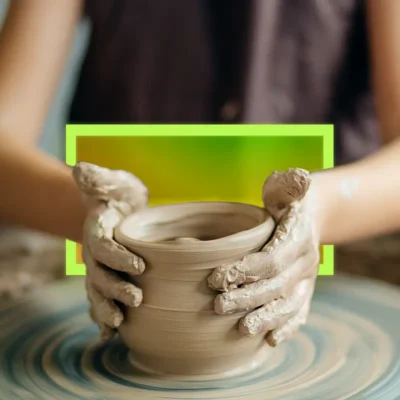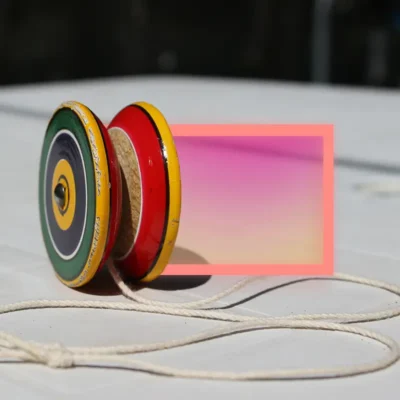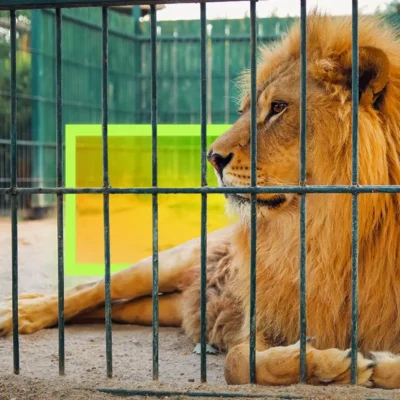My grandfather the Aikido master
Growing up half-Japanese in South Florida, Kino MacGregor spends a lot of time feeling uncomfortable in her own body. But her Japanese grandfather is always there for her, and they spend joyful hours together every day, playing hide-and-seek, cooking and eating, practicing aikido. Behind his joy, she learns only later, hides a profound grief — one that carries down the generations. In Kino’s Ashtanga yoga practice, she finds the tools to process this grief and sadness she’s unknowingly carried.
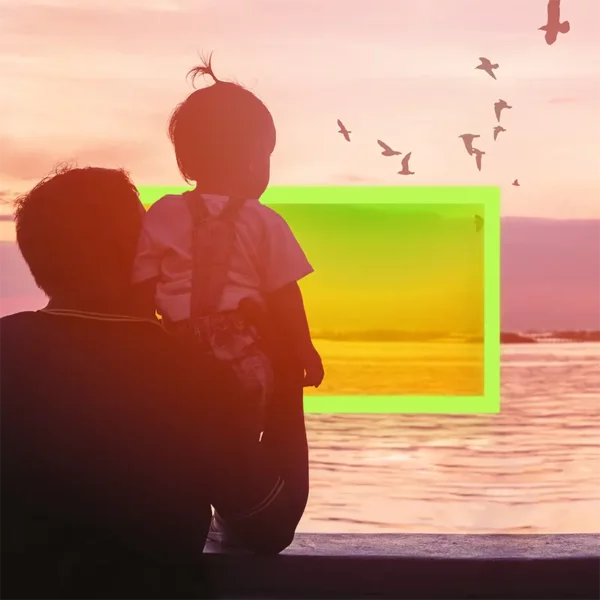
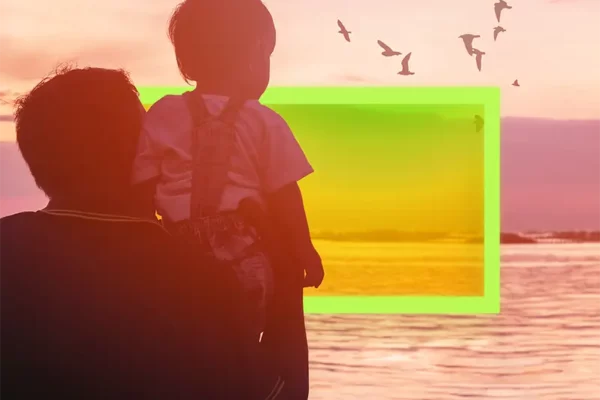
Table of Contents:
Transcript:
My grandfather the Aikido master
KINO MacGREGOR: My grandfather’s body is a contradiction. He’s small and thin but also very strong and agile. Moments before this, he put me on his back, and we cruised around the house together. He’s this kinetic bundle of energy, but his presence is like an anchor for me. Something to keep me grounded and comfortable.
ROHAN GUNATILLAKE: For Kino MacGregor, growing up half-Japanese in Southern Florida wasn’t always easy and often made her feel uncomfortable in her own body. As an author and highly-regarded Ashtanga Yoga teacher, she now has the tools to process these feelings through a physical practice. In this episode, Kino shares how spending time with her Japanese grandfather taught her to be aware of her body, recognize what it needs, and understand the impact of generational trauma.
In this series, we combine immersive first-person stories, breathtaking music, and mindfulness prompts so that we may see our lives reflected back to us in other people’s stories. And that can lead to improvements in our own inner lives.
From WaitWhat, this is Meditative Story. I’m Rohan, and I’ll be your guide.
The body relaxed. The body breathing. Your senses open. Your mind open. Meeting the world.
MacGREGOR: My grandfather pulls a container of strawberries from the fridge and a bag of powdered sugar from the cabinet. I watch his lean frame move through the kitchen, gathering ingredients. He wears a white tee shirt. A long piece of fabric with Japanese Kanji characters drapes around his neck like a scarf. This is how he always dresses.
His knife cuts quickly and cleanly through the strawberries. He discards the stems with precision. The juice leaks onto the wooden cutting board, and it leaves this pinkish stain.
I scrunch up my face and inspect the fruit with a good bit of uncertainty. I’m seven years old, and I’m a very picky eater. Most of the food in our house comes in plastic containers or cans, aimed at one dietary fad or another. This is pretty standard for the United States of America in the 1980s, but to me it all feels gross.
I’m sensitive to textures, smells, even sounds. Sometimes my parents will turn on the news during dinner, and I feel myself tense up, wishing I could jump into the ocean to have some quiet. Feeding myself becomes a chore.
But these strawberries don’t look too bad. I kind of want to try one. But I’m not sure how.
Grampy pours the powdered sugar into a glass bowl. One by one, we dip the heads of strawberries into the sugar and arrange them on a plate. They look like little mountaintops covered in snow.
“Now, Kinochan, just try a piece for me.” I pop a piece of the fruit into my mouth. The sweet powder dissolves on my tongue. My grandfather meets me with a grin and a warm gaze of love I know is only for me.
Grampy has a way of magically transforming food into these fun little experiences. He feeds me bits of sweet potato, thinly sliced and drizzled in teriyaki sauce. He mixes rice with rice wine vinegar and forms little balls before rolling them into sesame seeds. He spent a lifetime working as a chef in Japan and then New York City. Now he lives with me and my parents in Miami and uses his skills to get me to try new things.
He teaches me that food doesn’t have to be a chore. It can be nourishing, both physically and spiritually. For a moment, my feelings of overstimulation fade away, and I become aware of my body and its enjoyment of these new flavors.
“Ok, hold still,” my mom says as she puts the camera up to her eye. I’m standing in tree pose, with my right foot tucked up against the inside of my left thigh. I quickly glance over at Grampy to make sure my hands are in the same position as his, and I almost lose my balance.
The camera shutter clicks, and a blinding flash momentarily lights up the room. My Grampy never blinks, never falters. I mimic his movements as best I can. Not just now, but all the time. I follow him from room to room, walking like he walks, mirroring his impeccable posture. I take all my cues from this precise Aikido master who sleeps in the room next to mine.
My grandfather’s body is a contradiction. He’s small and thin but also very strong and agile. Moments before this, he put me on his back, and we cruised around the house together. I tucked my head next to his and felt the smoothness of his skin. I could have totally fallen asleep on his back. He’s this kinetic bundle of energy, but his presence is like an anchor for me. Something to keep me grounded and comfortable.
I’m so rarely comfortable in my own body. Growing up in South Florida with a Japanese mom and Scottish dad, both first generations born in the U.S., I don’t quite know where I fit in. I have my family and plenty of people who care about me, but within my own body and mind, I feel this turmoil. A sense that I don’t know where to call home.
I’m instinctively drawn to my grandfather, who seems so confident and at ease and whole.
I’m 6 years old, and Grampy helps Mom and me dress in our brightly colored kimonos. The fabric is both heavy and light. I think it’s a type of silk with these beautiful patterns.
I don’t normally wear my kimono to school, but today is Class Presentation Day. I have to get up in front of my whole class and tell them what being half-Japanese means to me.
I don’t get the opportunity to express much pride in my Japanese culture, so this one day out of the year is where we get to celebrate. It’s pretty cool to me. My mom does most of the talking. She explains that we are Japanese, and that this is our family culture.
It feels special. I stand tall in my kimono shoes — elevated wooden sandals that make walking challenging. But it doesn’t matter, I embrace this part of my identity today.
On so many other days, it feels like I’m stuck explaining myself to people who don’t even want to understand.
I’m at recess one day when a classmate comes up to me and says, “Kino, you don’t look like the rest of us. Your face is flat, and your eyes are weird. What are you anyway?”
“What are you?” Not “where are you from,” or “what’s your cultural ancestry.” Just, what are you?
I don’t know how to answer him. Every careless comment makes me feel more detached from my body. Someone kicks a soccer ball near us, and the boy with the hurtful questions runs away unphased. But me? I’m too stunned to move. I don’t tell my parents about the incident. I don’t tell anyone.
But when I go home, Grampy is there. He makes everything okay. We look like each other. We understand each other. And he’s so proud to be an American. He defected here right before World War II and has become totally immersed in the culture. He celebrates all the holidays. He even likes going to McDonalds. He’s comfortable here, which means that maybe, I can be comfortable here too.
He invites me to play hide-and-seek with him. Even in his 80s, he’s able to fold himself into ridiculously small spaces. I look behind the couch, under the kitchen table. I open the linen pantry, and there he is hiding behind the sheets with an enormous smile. The tension releases from inside me. I’m at ease again. I know where I belong. It’s right here.
GUNATILLAKE: Let’s flow with Kino’s sense of ease and invite it into our body too. Whatever we are hiding right now, breathe it out and allow any tension that needs to release to do so.
MacGREGOR: I walk to the family altar in the nook just outside my bedroom. I kneel down and light the incense. As the scent and the smoke wafts through the air, I feel like I’m floating.
I ring the traditional bell three times, bow my head, and then move on. And yet the bell, and the sound of the ring, seems to reverberate out endlessly. This is the very stoic Asian way to express grief. Go through the motions. Every day.
I’ve just turned nine, and this is how I’m taught to grieve my grandfather.
I’ll learn later that he had cancer, but in this moment, nobody talks about it. My mom’s way of processing the grief seems to be to keep going. At all costs, keep moving forward. She doesn’t cry in front of me. Her only words are, “Your Grampy’s body was in a lot of pain, and now he’s free. It was better for him to pass.”
No one asks me how I’m feeling or how I’m doing. That sense of ease I got from Grampy’s presence is ripped away, and I’m left to navigate this bottomless grief alone.
The weeks and months following Grampy’s death are a blur. I have a birthday. We cut a cake and everything, but, honestly, I don’t remember it. I feel lost and uncomfortable in my own skin. I don’t know how to dress anymore. I don’t know how to move. I’m disconnected from the motions of my own body.
I still want to talk to him. I want him to come bolting through the front door and scoop me up into his arms. I want to tell him how lost I feel.
This experience begins a cycle of depression that continues for years. I suffer from episodes where I go into a dark place, and I feel completely helpless and hopeless. I manage to come out of it, and then I end up going back into a really dark place. There are moments of light, moments of happiness, but that feeling of grief, of not wanting to be in my own skin, always returns.
I stand at the back of the class, unsure where to lay my mat down. I don’t want to be in anyone’s way, but I also need to make sure I can see the instructor. Because I have no idea what I’m doing. I’m 19 years old, and this is my first yoga class. The class is in a gym, and there are big glass windows and mirrors.
I’ve been struggling recently. My depression is really bad, and I haven’t wanted to do much of anything. I don’t want to eat. I don’t want to move. My mind feels bored and numb. I know I need to change something to pull myself out of this.
So, when I hear about an ashtanga yoga class at the local yoga center, I figure, “Sure, why not?”
When the powerful flow of this practice takes over, it feels like nothing else. Breath, body, mind as one. This inner sense of quiet calm, a feeling of expansion, connection. After a few repetitions, those feelings of numbness and sadness start to fade. The precision of these movements force me to become aware of my body in a way that I haven’t felt since I was a kid. Since the days I spent mimicking Grampy’s posture, the way he would hold his hands. The way he would stand and sit.
That untethered feeling that has consumed my body and mind so many times over the years is replaced by a sense of stability. Of feeling rooted. Of feeling whole. I stick with the class. I want to see what else I can get from this.
GUNATILLAKE: Feeling rooted. Drop your awareness into the parts of the body which are in contact with the earth. Let’s see if our mind can rest here as Kino continues her story.
MACGREGOR: My mom puts her tea cup down on the coffee table and turns a little away from me. Her lips are pursed tightly. There are a lot of things my mom won’t talk about if I don’t ask her about it point blank. “I’m just trying to get more information,” I say. “What happened after Grampy was in the internment camp?”
When I was young, this topic was too serious to bring up. But here, sharing a warm beverage in our family room, I think of myself as more mature and I want to try to understand what my grandfather’s life was like.
My mom tells me that after the war, the U.S. government said that every Japanese person who had been in an internment camp was entitled to a certain amount of money. A lot of money, actually. But my grandfather refused to take it.
“This country gave me my life. I love this country. They owe me nothing. That’s what he said.
I sit back and think about what this must have felt like for my grandfather, this man who always seemed so at ease. So at home. He defected to the United States before the war even started, and they put him in a camp. Still, his love of country never waivered. He didn’t let the grief and trauma of that experience stop him from being fully present with his family. With me.
I hadn’t thought of myself as someone who needed to deal with the impacts of race trauma. I’m proud of being Japanese. But sitting here, talking with my mom about her life, Grampy’s life, I realize those dark moments I experience, those spirals of negative-self talk and depression, are at least partially tied to this inherited grief. There is a foundation at the root of all these negative thoughts. This tension, trauma, and grief lives in my body from the time I’m a child. I get curious if, perhaps, the solution does too?
It’s April. Monsoon season. The air in my sparse second floor apartment is so thick with humidity. The only reason to close the window would be to make sure the monkeys don’t get in. I’ve been in India for four months, in a suburb outside Mysore, and tonight I can’t sleep.
I’m here practicing Ashtanga yoga, working my way towards a deeper understanding of this ancient practice. In the last five years, yoga has become a new constant in my life. I find the more I do it, the happier I get. I spend hours pushing my body to new limits, sensing where I’m holding tension and also discovering where I need more support.
After so much time spent adrift and uncomfortable in my own skin, I start feeling like I’m coming back into my body.
We practice our forms every day at 3:30 a.m. in the morning, when the temperature is slightly cooler. We’ve just finished today’s practice session. I should probably be exhausted. But instead, I’m staring up at my broken ceiling fan, the only source of air conditioning in this tiny room, and running my fingertips along the cool polished floor next to my bed.
I don’t feel like I’ve escaped the cycle of depression that began with the death of my grandfather. There are times when I still find myself in those dark places. Times when I feel uneasy in my own skin.
Continuing to practice yoga and learning the language of my body, its needs, its possibilities and limitations, has created a path for me to heal. When we ground ourselves and form a strong connection between our mind and our body, we can start to untie the knots that keep us from being whole.
That sense of wholeness and comfort I have been searching for since Grampy died, I now know I can find in myself. I am the person that makes me okay.
Rohan’s closing meditation
GUNATILLAKE: Thank you Kino.
There’s something about Kino’s grandfather. I think it’s that he teaches her just by being who he is. Movements precise. Full of playful energy. Infectiously so. But also at the same time, he is an anchor for Kino.
So for our closing meditation together, let’s be inspired by her grandfather, her Grampy, and explore the qualities that made him such an important figure in Kino’s life. We’ll reflect Kino’s mastery of yoga too by bringing a sense of fluidity and flow — as much as we can — to how we move through the set of instructions as I share them.
And we start in our own skin. We have no other. At times in her story, Kino felt comfortable here; at times, she did not. How do you feel? How is the body? How is the skin? Is there tension? Agitation? Is there softness? Relaxation? Just knowing what is here. Not a time for judging or giving ourselves a hard time. Just knowing what is here.
Staying with the body, again without judgment. Imagine what an immaculate posture means to you. And let your body be nudged towards it. The lifting of a spine. The softening of a jaw. The ease of an outbreath. No effort.
Kino’s grandfather was strong and agile. Let’s express this in our breath. The breath energizing but fluid. However your body is. Breathing in, there is strength. Breathing out, there is agility.
In meditation, the breath can also be an anchor. An anchor for our attention. Letting the gravity of the breath do its work, draw all our attention there. Mind knowing breath. Anchored to breath. Anchored to body.
Connected to the breath. And attention soft and open. What small sensory delights are here to be known. A coolness on the skin. A warmth maybe. A sugared strawberry. A sensation of calm. A sensation of calm, masquerading as blankness.
Now smile. Even if you don’t feel like it. Letting the natural softening of the mouth spread to your shoulders and hands.
Kino’s grandfather had enormous gratitude for his adopted country. The country that in his words gave him life. What gives you life? What are you grateful for?
Grampy also was full of contradictions. And if you’re anything like me, you are two. Can you also be grateful for your contradictions? Notice any tension or chatter that comes up when you bring yours to mind. Softening it if we can, and instead allowing gratitude to be here.
Our contradictions, part of what makes us us.
For a young Kino, Grampy made everything ok. And it can be. Everything can be ok. Everything is ok.
We close as we started. In our own skin. And if you’re able, remembering what it was like in this skin at the start of the meditation. And knowing what it is like now.
Thank you again Kino, for your story. And thank you. Flow well.
We’d love to hear your personal reflections from Kino’s episode. You can find us on all your social media platforms through our handle @meditativestory. Or you can email us at: [email protected].
